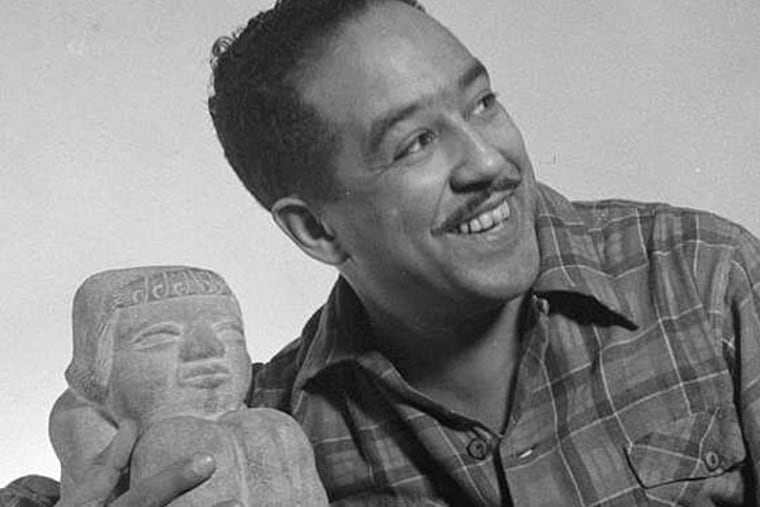Glen Foerd’s grand architecture and moody rooms set the stage for an immersive Langston Hughes experience
“The Ways of White Folks” premieres at the historic estate in a promenade-style staging, co-presented by EgoPo Classic Theater and Theatre in the X.

This weekend, Langston Hughes’s 1934 short story collection The Ways of White Folks will come alive at the mansion at Glen Foerd in an immersive production that transports the audience to the 1930s and the Harlem Renaissance. Copresented by EgoPo Classic Theater and Theatre in the X, the world premiere performance opens Jan. 13.
Biting and clever, The Ways of White Folks is a sardonic take on interracial relations inspired by true stories. Co-directors Ontaria Kim Wilson and Dane Eissler have selected eight of the book’s 14 stories to perform as separate short performances in different areas of the estate, culminating in a rebellious finale. They have designed an immersive experience where, upon arrival, guests are welcomed to the Colony of Joy, a New Age retreat, by Eugene Lesche. Lesche is the con man protagonist in Hughes’s “Rejuvenation Through Joy,” who profits from exploiting Black culture and selling it to white people. He is the host for the night.
The audiences are attendees of Lesche’s questionable retreat and are “almost complicit with this idea of going to the Colony,” says Eissler, EgoPo’s artistic producer. “You’re at opening night of the Colony and you see a little bit of the behind-the-scenes tension between the folks running it and the folks working it.” It’s all part of the act. The audience divides into seven groups, of a dozen or so, and follows tour guides — Lesche’s workers — before reuniting for the finale.
Guests will walk up and down stairs to see the action inside and outside the mansion, and performers will engage them in conversation and offer refreshments, occasionally breaking the fourth wall. There’s no touching allowed and the theater strongly encourages attendees to wear masks. The actors play a game of endurance, performing their individual short stories seven times a night as the groups cycle through.
Glen Foerd provides a compelling location given its grand architecture and long history. “My first experience walking into Glen Foerd, it made the stories come to life for me,” says Wilson.
Wilson stars in “Cora Unashamed,” about a Black maid who works for a wealthy white family and cares for their daughter. Wilson brings audience members into the family’s kitchen. “Glen Foerd has a humongous kitchen area … it lended itself to the storytelling [with] the views from the high windows into the beautiful estate,” she says. “Becoming the character, placing me in those places and times, it just works together like magic.”
The moody German-style bar in the basement, called a rathskeller, felt right for “Red-Headed Baby,” which takes place in a dark brothel. One opulent bedroom will host “Home,” which examines a Black jazz musician who left the U.S. for Paris and found success. The room’s views of the Delaware echo his memories of the Seine.
Historic furniture on site helped flesh out the setting. A library complete with an antique desk and chair pairing sets up “Passing,” which centers on a white-passing Black man as he writes a letter to his mother. During one recent rehearsal break for “Mother and Child,” someone looked above a fireplace and noticed a sculpture of a mother and her baby. “It just spoke to my spirit, it spoke to Dane’s spirit, like yeah, this is where it needs to take place,” says Wilson.
In conceptualizing the book for the stage, Wilson and Eissler did not veer far from Hughes’ words.
“The words as written are just so vibrant and evocative and kind of scathingly funny, almost like it was a Jordan Peele movie written today,” says Eissler. The duo worked with EgoPo artistic director Lane Savadove, who had the idea to do dynamic staging. They workshopped the promenade-style performance in classrooms, hallways, and a black box theater at Rowan University, where Savadove teaches. Around the time that Wilson and Eissler began working on the production last year, EgoPo was in talks with Glen Foerd. They were eager to collaborate after the theater’s successful Alice in Wonderland production at the estate in 2021.
“[Glen Foerd] is an inherently, historically white space — it was this mansion for an affluent Philadelphian family,” says Eissler. “The folks at [the estate] have been really working to make it a multicultural arts spot, so the kind of reclamation of a formerly white-centric space was really exciting to them.”
Built around 1850 by Charles Macalester, Glen Foerd was originally a summer residence that hosted lavish galas for the wealthy and well-connected. By the time Hughes published The Ways of White Folks, it was home to Florence Foerderer, an influential arts patron who inherited it from her parents. According to the estate’s website, there was one notable domestic staffer who served the Foerderer family: Arthur Laws, a Black butler who worked at Glen Foerd from 1908 to 1931. Despite his position atop the estate staff, Laws was paid less than some of his white underlings — a circumstance that Hughes likely would’ve found ripe for inclusion in The Ways of White Folks.
“The Ways of White Folks” runs Jan. 13-22 at the Mansion at Glen Foerd, 5001 Grant Ave., Phila., 215-632-5330, or egopo.org.